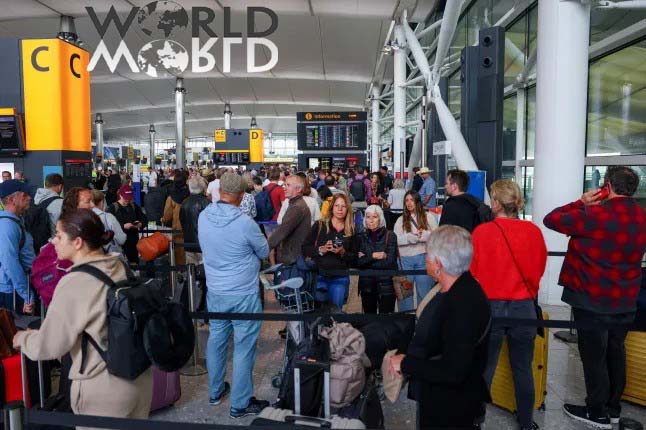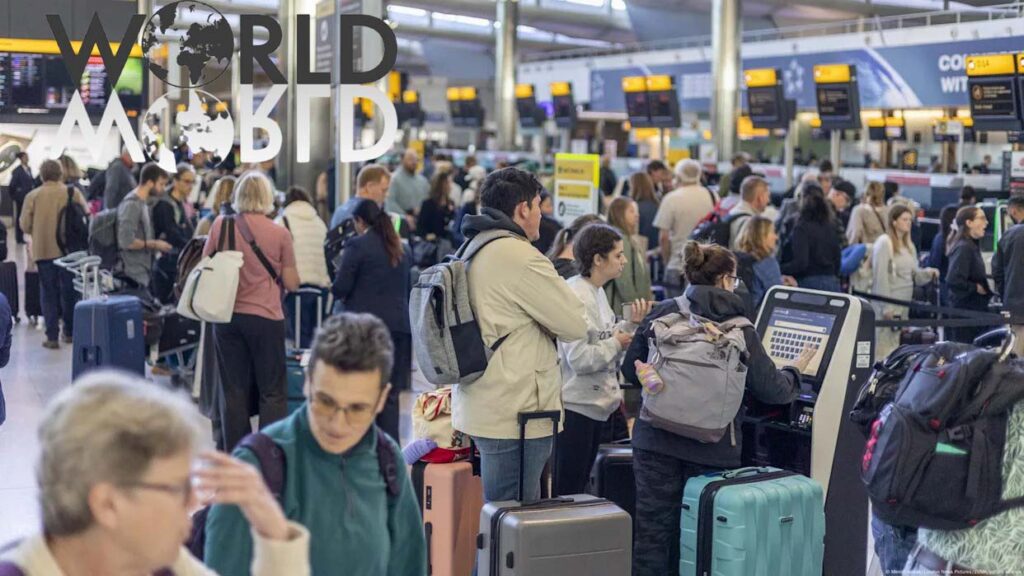UK police arrest man over hack that that caused airport disruptions … 2025
British authorities have confirmed the arrest of a Airport security breach UK 2025Airport security breach UK 2025Airport security breach UK 2025 in his 40s as part of an ongoing.
Investigation into a ransomware attack on Collins Aerospace, a company owned by RTX. The cyberattack crippled airport check-in systems across Europe, leading to widespread travel disruption and operational delays.
Suspect Arrested Under Computer Misuse Act
The UK’s National Crime Agency (NCA) said the suspect was taken into custody on Tuesday for suspected violations of the Computer Misuse Act. He has since been released on conditional bail pending further inquiries.
NCA Deputy Director Paul Foster described the arrest as an important milestone but stressed that the case is far from over:
Although this arrest is a positive step, the investigation into this incident is in its early stages and remains ongoing.
Who Was Behind the Collins Aerospace Cyberattack?
Authorities have not yet identified which cybercriminal group orchestrated the attack. Normally, ransomware gangs publish stolen data or claim responsibility on dark web leak sites, but as of Wednesday, no group has publicly taken credit.
Cybersecurity experts note that ransomware attacks involve hackers encrypting a company’s data and demanding payment for its release. While these groups often target businesses for financial gain, many attempt to avoid high-profile targets that may attract government crackdowns.
Ripple Effects Across Europe
The Collins Aerospace hack was the latest in a growing wave of cyberattacks in Europe with real-world consequences:Jaguar Land Rover, the UK’s largest carmaker owned by Tata Motors, has extended its factory shutdown until October 1 following a cyber incident earlier this month that paralyzed its supply chain.
Berlin Brandenburg Airport confirmed it was one of several airports impacted by the Collins.
Aerospace breach and said it may take several more days before secure systems are fully restored.
Multiple European airports reported offline check-in systems, causing delays and cancellations that stranded travelers across the region.
Aviation and Automotive Sectors Under Threat
The attack underscores growing concerns about the vulnerability of critical infrastructure in sectors like aviation, defense, and automotive manufacturing. Security analysts warn that such disruptions highlight the urgent need for stronger cybersecurity measures to protect against ransomware gangs.
Investigation Ongoing
The FBI and European cybersecurity agencies are assisting UK authorities in tracking the origins of the hack. Officials have not ruled out the involvement of international cybercrime groups, but no definitive link has been established.
The NCA urged businesses to strengthen cyber defenses and for the public to remain alert to evolving online threats.
The National Crime Agency (NCA) has confirmed the arrest of a man in his 40s in West Sussex as part of an ongoing investigation into the cyberattack on Collins Aerospace, a major supplier of airline baggage and check-in systems. The attack caused days of travel disruption across European airports, leaving airlines scrambling to use manual check-in methods such as pen and paper.
Arrest Linked to Collins Aerospace Ransomware Incident
The man was detained on Tuesday evening under suspicion of Computer Misuse Act offences and has since been released on conditional bail.
Paul Foster, head of the NCA’s National Cyber Crime Unit, confirmed progress but warned the case is far from over:
“Although this arrest is a positive step, the investigation into this incident is in its early stages and remains ongoing.”
Airlines and Airports Still Facing Delays
The software outage, first detected on Friday night, led to hundreds of flight delays and cancellations across major hubs including Heathrow, Berlin, Brussels, and Dublin airports.
At Heathrow Airport, additional staff have been deployed to assist passengers, though delays continue.
Berlin Airport announced that check-in and boarding remain “largely manual,” leading to longer queues and potential cancellations.
Brussels Airport advised passengers to complete online check-in before arrival to minimize disruption.
An internal memo shared with Heathrow staff revealed that Collins Aerospace is still rebuilding its system, after a failed attempt to relaunch services earlier this week.
Ransomware at the Core of the Cyberattack
The EU Cybersecurity Agency confirmed on Monday that the attack involved ransomware, a type of malicious software used by cybercriminal gangs to lock systems and demand payment in cryptocurrency.
Ransomware has become a multi-billion-pound industry, with organized groups worldwide exploiting critical industries such as aviation, defense, and manufacturing. A recent report by French aerospace company Thales revealed that cyberattacks on aviation networks have surged by 600% in the past year.
Readmore Seven Indian-sponsored terrorists killed in DI Khan operation: ISPR … 2025
Collins Aerospace and RTX Respond
Collins Aerospace, a subsidiary of RTX Corporation, told the BBC it was working closely with the NCA and cybersecurity experts:
“We appreciate the NCA’s ongoing assistance in this matter,” the company said, while urging airlines and ground handlers to prepare for at least another week of manual workarounds.
No official timeline has been set for when the system will be fully operational again.
Growing Cybersecurity Threats in Aviation. The Collins Aerospace breach has reignited concerns over aviation cybersecurity, as attacks increasingly move beyond digital networks to impact real-world travel operations. Experts warn that unless stronger defenses are implemented, airports and airlines will remain vulnerable to ransomware gangs seeking high-value targets.
The National Crime Agency (NCA) has warned that cybercrime remains a serious global threat, following a major cyber incident impacting Collins Aerospace, which disrupted airport operations across Europe.
Investigation into Collins Aerospace Hack
The NCA launched its investigation after the cyberattack was first reported last Friday. Collins Aerospace — a leading aviation technology provider and a subsidiary of RTX Corporation (formerly Raytheon) — supplies check-in and baggage drop software to multiple airlines worldwide.
On Saturday, the company confirmed it had identified a cyber-related disruption affecting its MUSE software in several airports, primarily impacting electronic check-in and baggage services.
Flight Delays, Cancellations, and Manual Check-ins
The cyberattack forced airlines to revert to manual check-in and baggage drop procedures, significantly slowing passenger processing and causing widespread delays.
Dublin and Cork airports in Ireland were among the hardest hit.
Brussels Airport canceled dozens of outbound flights, though officials said Wednesday that operations were gradually returning to normal.


